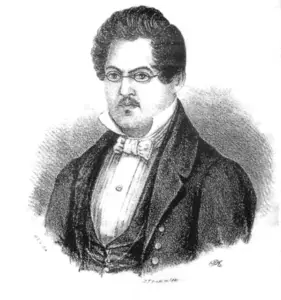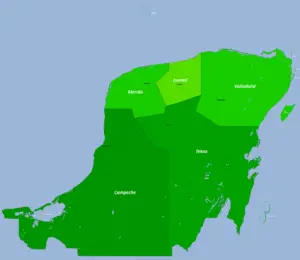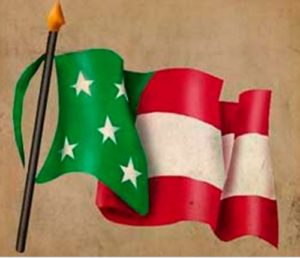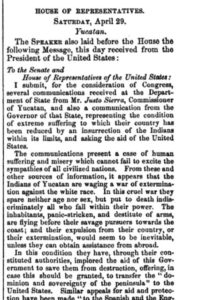Podcast: Play in new window | Download
Subscribe: Apple Podcasts | RSS
 33-year-old Justo Sierra O’Reilly had traveled a great distance for his cause. The son-in-law of the President of the new Republic of Yucatán, Sierra left the port of Campeche with a small entourage on September 12, 1847. The official delegation, aboard the merchant ship Alabama, landed in New Orleans on October 4th. Sierra and his fellow yucatecos would take three weeks to get to Washington DC from New Orleans. They traveled by riverboat up the Mississippi, Ohio and Monongahela Rivers and took a stagecoach to Cumberland, Maryland across the Allegheny Mountains. At Cumberland, the group boarded a train, which was an unusual experience for them, for at the time no railroads had existed in Mexico. They arrived at their final destination on November 16, 1847, never before experiencing such a bone-chilling winter in a climate so different from their home. On November 22, 1847 Justo Sierra O’Reilly presented his credentials to Secretary of State James Buchanan and through a translator he made requests of the American government on behalf of the Republic of Yucatán. Mexico did not recognize Yucatán’s independence and neither did the US. The government of this new nation in Mexico’s Yucatán Peninsula wanted to remain neutral in the current war between Mexico and the US known to history as the Mexican War. In the course of this war, the US was occupying the Mexican port of Ciudad del Carmen in Campeche, which was technically part of the Republic of Yucatán. Sierra kindly requested an end to the occupation. He also wanted all tariffs lifted on Yucatecan goods coming to the United States. Secretary Buchanan requested Sierra draft his requests in a formal document. He did so and waited more than a month for a response. During this frustrating waiting period, Sierra and other members of his small delegation met with members of Congress to curry favor and make American lawmakers aware of their concerns. Many Congressmen, and indeed many Americans, were unfamiliar with this tropical republic that was once recently part of Mexico. Sierra was happy to tell the story of his homeland.
33-year-old Justo Sierra O’Reilly had traveled a great distance for his cause. The son-in-law of the President of the new Republic of Yucatán, Sierra left the port of Campeche with a small entourage on September 12, 1847. The official delegation, aboard the merchant ship Alabama, landed in New Orleans on October 4th. Sierra and his fellow yucatecos would take three weeks to get to Washington DC from New Orleans. They traveled by riverboat up the Mississippi, Ohio and Monongahela Rivers and took a stagecoach to Cumberland, Maryland across the Allegheny Mountains. At Cumberland, the group boarded a train, which was an unusual experience for them, for at the time no railroads had existed in Mexico. They arrived at their final destination on November 16, 1847, never before experiencing such a bone-chilling winter in a climate so different from their home. On November 22, 1847 Justo Sierra O’Reilly presented his credentials to Secretary of State James Buchanan and through a translator he made requests of the American government on behalf of the Republic of Yucatán. Mexico did not recognize Yucatán’s independence and neither did the US. The government of this new nation in Mexico’s Yucatán Peninsula wanted to remain neutral in the current war between Mexico and the US known to history as the Mexican War. In the course of this war, the US was occupying the Mexican port of Ciudad del Carmen in Campeche, which was technically part of the Republic of Yucatán. Sierra kindly requested an end to the occupation. He also wanted all tariffs lifted on Yucatecan goods coming to the United States. Secretary Buchanan requested Sierra draft his requests in a formal document. He did so and waited more than a month for a response. During this frustrating waiting period, Sierra and other members of his small delegation met with members of Congress to curry favor and make American lawmakers aware of their concerns. Many Congressmen, and indeed many Americans, were unfamiliar with this tropical republic that was once recently part of Mexico. Sierra was happy to tell the story of his homeland.
The Yucatán was its own independent state once before, for a brief seven months before joining the newly independent country of Mexico in 1823. While technically part of New Spain during Spanish colonial times, the Captaincy General of Yucatán enjoyed a great degree of autonomy from the viceregal government out of Mexico City. When Spain granted independence to New Spain, the government of the new nation of Mexico oscillated between a loose type of federalism and strict central control. When the pendulum swung to the side of an intense form of central government under President Antonio López de Santa Anna in the 1830s, the people of the Yucatán yearned for the autonomy and total independence they once had. The local Chamber of  Deputies adopted the Act of Independence of the Yucatán Peninsula on October 1, 1841. The new country had an innovative constitution considered more progressive than that of Mexico at the time. The Yucatán constitution guaranteed freedom of religion and guaranteed trial by jury. It also established legal checks on abuse of government power and abolished forced military service. The flag of the Republic of Yucatán contained the same colors of the Mexican flag: white, red and green. It was divided into two fields, on the left a field of green with five stars. The stars represented the five departments of the new nation: Mérida, Izamal, Valladolid, Campeche, and Tekax. The right field of the Yucatán flag was divided into three stripes, red on the top and bottom, and white in the middle. For the first few years of the republic there were two major factions vying for power, one centered in the traditional capital of the region, Mérida, and the other centered in Campeche. At the time the Yucatán Republic sent its delegation to Washington in 1847, the country was united with Justo Sierra O’Reilly’s father-in-law, Santiago Méndez as president.
Deputies adopted the Act of Independence of the Yucatán Peninsula on October 1, 1841. The new country had an innovative constitution considered more progressive than that of Mexico at the time. The Yucatán constitution guaranteed freedom of religion and guaranteed trial by jury. It also established legal checks on abuse of government power and abolished forced military service. The flag of the Republic of Yucatán contained the same colors of the Mexican flag: white, red and green. It was divided into two fields, on the left a field of green with five stars. The stars represented the five departments of the new nation: Mérida, Izamal, Valladolid, Campeche, and Tekax. The right field of the Yucatán flag was divided into three stripes, red on the top and bottom, and white in the middle. For the first few years of the republic there were two major factions vying for power, one centered in the traditional capital of the region, Mérida, and the other centered in Campeche. At the time the Yucatán Republic sent its delegation to Washington in 1847, the country was united with Justo Sierra O’Reilly’s father-in-law, Santiago Méndez as president.
In the middle of December of 1847 US Secretary of State James Buchanan met with President James K. Polk to discuss the Yucatán situation. Buchanan gave Justo Sierra the president’s reply on Christmas Eve. The US would not end the occupation of Ciudad del Carmen and would not recognize the Republic of Yucatán as a sovereign nation. It would, however, honor the Yucatán’s desire to be neutral in the US-Mexico conflict and the president agreed to lift the tariffs that had burdened the territory. The Yucatán delegation in Washington saw that as a small victory, but it was not enough, and they stayed in the United States through the holidays with plans to depart in early 1848, eager to leave the cold climate behind. Fate, however, had other plans.
Throughout the 1840s, the indigenous Maya throughout the Yucatán Peninsula felt disgruntled for having to pay high taxes and for being forced to work on plantations as little more than slaves. In the summer of 1847, Maya rebels attacked the town of Tepich, which some scholars mark as the beginning of what the history books call the Caste War. This internal conflict was a series of indigenous uprisings throughout the peninsula. The leaders of the Maya rebel movement vowed to kill all non-indigenous people in the Yucatán. For more information about the Caste War, please see Mexico Unexplained Episode number 70 titled “The Mayan Cult of the Talking Cross.” https://mexicounexplained.com//mayan-cult-talking-cross/ By the beginning of 1848 the indigenous violence had become so intense that President Méndez of the Republic of Yucatán shifted the priorities of the Washington delegation. The Maya issue overshadowed all other issues. Yucatán needed military assistance to help put down this indigenous rebel movement. What could it offer in exchange? President Méndez proposed to give away the very sovereignty of his country to any foreign power that would come to assist in this critical situation. The Yucatán president reached out to Spain and Great Britain with the same offer: help us end this rebel movement and you can come in and take over our country. Britain and Spain  turned down Méndez’ offer, but the fact that he made the offer was taken very seriously by lawmakers in the United States. The War of 1812 was still fresh in the minds of most Congressmen. Many in the United States held dear the ideals of the Monroe Doctrine which considered European expansion in the Americas to be an act of aggression. Rumors that the British were fueling the Maya rebel movement by supplying the insurgents guns through British Honduras were most concerning. No one wanted any European power, least of all Great Britain, to expand their empire in the Western Hemisphere and pose a possible future threat to the power of the United States.
turned down Méndez’ offer, but the fact that he made the offer was taken very seriously by lawmakers in the United States. The War of 1812 was still fresh in the minds of most Congressmen. Many in the United States held dear the ideals of the Monroe Doctrine which considered European expansion in the Americas to be an act of aggression. Rumors that the British were fueling the Maya rebel movement by supplying the insurgents guns through British Honduras were most concerning. No one wanted any European power, least of all Great Britain, to expand their empire in the Western Hemisphere and pose a possible future threat to the power of the United States.
Justo Sierra used this fear of European expansion to drum up support for Yucatán in the press and with congressmen while he waited for Buchanan’s answer to his pleas for help. Tired of waiting for the Secretary of State to respond, on Saturday, April 22, 1848, Sierra bypassed Buchanan and wrote a letter directly to President Polk himself. Polk agreed to meet that very evening. Sierra made his case and by Tuesday the US President met with his cabinet urging for intervention. He stated that he would never let the Yucatán fall into the hands of a European power and was in favor of “ultimate annexation.” On April 28, 1848 President Polk sent his Bill for the Relief of the Yucatan to Congress along with a letter for American lawmakers. In the letter President Polk wrote:
“To the Senate and House of Representatives of the United States: I submit, for the considerations of Congress, several communications received at the Department of State from Mr. Justo Sierra, Commissioner of Yucatan, and also a communication from the Governor of that State, representing the condition of the extreme suffering to which their country has been reduced by an insurrection of the Indians within its limits, and asking the aid of the United States.
“The communications present a case of human suffering and misery which cannot fail to excite the sympathies of all civilized nations. From these and other sources of information, it appears that the Indians of Yucatán are waging a war of extermination against the white race. In this cruel war they spare neither age nor sex, but put to death indiscriminately all who fall within their power. The inhabitants, panic-stricken, and destitute of arms, are flying before their savage pursuers towards the coast; and their expulsion from their country, or their extermination would seem to be inevitable, unless they can obtain assistance from abroad.”
President Polk continued in the letter to Congress addressing his concerns of European involvement and invoking the sainted Monroe Doctrine as a reason for US intervention and eventual annexation of the Republic of Yucatán:
“Our own security requires that the established policy thus announced should guide our conduct, and this applies with great force to the peninsula of Yucatan. It is situated in the Gulf of Mexico, on the North American continent; and from its vicinity to Cuba, to the capes of Florida, to New Orleans, and indeed to our whole south-western coast, it would be dangerous to our peace and security if it should become a colony of any European nation.”
 The US President then went on to make the case for a military occupation of Yucatán and asked Congress to consider passing the bill. The House debated the bill for one day. The Congressional Record shows passionate arguments on both sides. The newspapers at the time mirrored this debate. Those who believed in Manifest Destiny and a continuing expansion of American territory were behind the idea. Those who believed the United States has already stretched itself thin with the recent acquisition of the Oregon Country and the ongoing war with Mexico opposed annexation. Without deciding on it, the House of Representatives handed off the bill to the Committee on Foreign Affairs where it awaited action by the US Senate. The Senate took up the bill and debated it for two weeks. Democrat from Indiana, Senator Edward Hannegan, was responsible for getting the Yucatán Bill through Congress. He was a firm believer in Manifest Destiny and even more of an expansionist than President Polk. Senator Hannegan tried to convince his colleagues of the dire threat from Great Britain and further stated that it was America’s duty to, “defend white civilization against barbarous savages.” The Senate scheduled the bill’s final arguments for May 16, 1848, but before the deliberations took place, important news arrived from Yucatán. Jacinto Pat, leader of the Maya rebels, had signed the Treaty of Tzucacab with the government of the Republic of Yucatán. Although the treaty was broken by the Maya rebels within days, the news of the signing of the treaty meant that the problems in the Yucatán were over in the minds of Americans. The Senate saw no need to pass the bill. One American newspaper even claimed that the Maya rebel leader, Jacinto Pat, was really Irish and that the Caste War between the Maya and the Yucatán government was a concoction and a ruse to get military and financial aid from the US.
The US President then went on to make the case for a military occupation of Yucatán and asked Congress to consider passing the bill. The House debated the bill for one day. The Congressional Record shows passionate arguments on both sides. The newspapers at the time mirrored this debate. Those who believed in Manifest Destiny and a continuing expansion of American territory were behind the idea. Those who believed the United States has already stretched itself thin with the recent acquisition of the Oregon Country and the ongoing war with Mexico opposed annexation. Without deciding on it, the House of Representatives handed off the bill to the Committee on Foreign Affairs where it awaited action by the US Senate. The Senate took up the bill and debated it for two weeks. Democrat from Indiana, Senator Edward Hannegan, was responsible for getting the Yucatán Bill through Congress. He was a firm believer in Manifest Destiny and even more of an expansionist than President Polk. Senator Hannegan tried to convince his colleagues of the dire threat from Great Britain and further stated that it was America’s duty to, “defend white civilization against barbarous savages.” The Senate scheduled the bill’s final arguments for May 16, 1848, but before the deliberations took place, important news arrived from Yucatán. Jacinto Pat, leader of the Maya rebels, had signed the Treaty of Tzucacab with the government of the Republic of Yucatán. Although the treaty was broken by the Maya rebels within days, the news of the signing of the treaty meant that the problems in the Yucatán were over in the minds of Americans. The Senate saw no need to pass the bill. One American newspaper even claimed that the Maya rebel leader, Jacinto Pat, was really Irish and that the Caste War between the Maya and the Yucatán government was a concoction and a ruse to get military and financial aid from the US.
In desperation, the new Yucatán President, Miguel Barbachano appealed to the central government of Mexico for help. Mexican President José Joaquín Herrera welcomed the rebellious province back into the fold and promised aid. On July 14, 1848 the Mexican government sent arms, ammunition and 150,000 pesos to Yucatán to help with the Maya uprising. The following month, August 1848, the bloody civil war ended with the Maya defeated. On August 17th Yucatán officially rejoined the country of Mexico.
Academics and alternative history buffs often wonder what would have happened if the news of the Treaty of Tzucacab had not reached the United States. What would have happened if the US Senate were able to debate the Yucatán Bill and ultimately decided on annexation? Would Yucatán have been admitted to the Union as a free state or a slave state? Famous tourist spots like Cancun and Cozumel, along with a good 75% of all Maya ruins would now be under the control of the United States. A terrifying thought or a delightful one? You decide.
REFERENCES
Abridgment Of The Debates Of Congress, From 1789 To 1856: Dec. 7, 1846-sept. 30, 1850 Buy the book on Amazon here: https://amzn.to/2ZTqDeq
De Armond, Louis. “Justo Sierra O’Reilly and Yucatecan-United States Relations, 1847-1848.” In, The Hispanic American Historical Review. Vol. 31, No. 3 (Aug., 1951), pp. 420-436.
